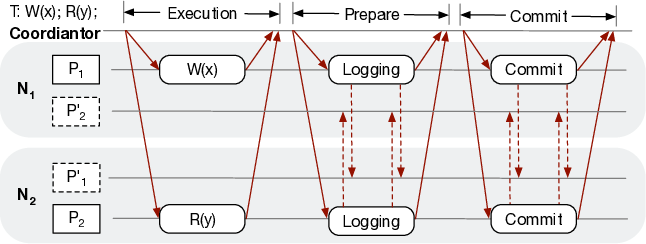Lion: Minimizing Distributed Transactions through Adaptive Replica Provision (Extended Version)
(2403.11221)Abstract
Distributed transaction processing often involves multiple rounds of cross-node communications, and therefore tends to be slow. To improve performance, existing approaches convert distributed transactions into single-node transactions by either migrating co-accessed partitions onto the same nodes or establishing a super node housing replicas of the entire database. However, migration-based methods might cause transactions to be blocked due to waiting for data migration, while the super node can become a bottleneck. In this paper, we present Lion, a novel transaction processing protocol that utilizes partition-based replication to reduce the occurrence of distributed transactions. Lion aims to assign a node with one replica from each partition involved in a given transaction's read or write operations. To ensure such a node is available, we propose an adaptive replica provision mechanism, enhanced with an LSTM-based workload prediction algorithm, to determine the appropriate node for locating replicas of co-accessed partitions. The adaptation of replica placement is conducted preemptively and asynchronously, thereby minimizing its impact on performance. By employing this adaptive replica placement strategy, we ensure that the majority of transactions can be efficiently processed on a single node without additional overhead. Only a small fraction of transactions will need to be treated as regular distributed transactions when such a node is unavailable. Consequently, Lion effectively minimizes distributed transactions while avoiding any disruption caused by data migration or the creation of a super node. We conduct extensive experiments to compare Lion against various transaction processing protocols. The results show that Lion achieves up to 2.7x higher throughput and 76.4% better scalability against these state-of-the-art approaches.

Overview
-
'Lion' introduces a novel transaction processing protocol to minimize distributed transactions in distributed databases by leveraging replication mechanisms.
-
It features an adaptive replica provision mechanism that dynamically adjusts replica placement based on workload analysis, aiming to co-locate frequently accessed partitions.
-
Experiments show 'Lion' outperforms existing approaches in throughput and scalability, efficiently handling dynamically changing workloads.
-
Future directions include enhancing prediction models, integrating 'Lion' into real-world applications, and exploring its compatibility with deterministic transaction processing.
Exploring the Adaptive Replica Provision with "Lion"
Introduction to "Lion"
Distributed databases often struggle with the performance bottlenecks associated with distributed transactions. Recent research endeavors like "Lion" have focused on devising strategies to minimize the frequency of these transactions by leveraging replication mechanisms inherent in distributed databases. "Lion" introduces a novel transaction processing protocol, aiming to predominantly execute transactions on a single node where all required data resides, thus reducing the reliance on distributed transactions.
Adaptive Replica Provision Mechanism
"Lion" harnesses an adaptive replica provision mechanism, which dynamically adjusts replica placement in response to the analyzed workload, ensuring that partitions frequently accessed together are co-located. This mechanism comprises two key components:
- Workload Analyzer: Identifies co-accessed partitions by constructing a workload access graph, clustering partitions accessed by recent and predicted future transactions.
- Plan Generator: Develops an optimization plan for replica arrangement, considering factors like the cost of rearranging replicas and load balancing, thus minimizing distributed transactions.
The mechanism's adaptivity is further enhanced by a workload prediction algorithm, using LSTM models to forecast future transaction behaviors. This allows for preemptive adjustments to replica placement, improving the system's responsiveness to workload shifts.
Evaluation and Findings
Experiments conducted on benchmarks such as YCSB and TPC-C demonstrate "Lion’s" superior throughput and scalability, outperforming state-of-the-art approaches by up to 2.7x. Particularly notable is "Lion’s" ability to maintain high performance under dynamically changing workloads and its scalability when increasing the number of nodes in the distributed database system.
Interestingly, the study reveals that "Lion," with its adaptive replica provision and prediction mechanism, can effectively dissipate load imbalances and preemptively respond to forecasted workload changes, thereby dramatically minimizing the need for distributed transaction processing.
Implications and Future Directions
The research on "Lion" opens several avenues for future work:
- Enhancing Prediction Models: Exploring more advanced time-series prediction models could yield more accurate workload forecasts, further reducing unnecessary distributed transactions.
- System Integration and Real-world Application: Integrating "Lion" into existing distributed databases and evaluating its performance in real-world application scenarios would provide valuable insights into its practical efficacy.
- Exploring Determinism: Analyzing "Lion's" compatibility with deterministic transaction processing approaches might reveal opportunities to combine the strengths of both strategies, offering even more substantial performance improvements.
Concluding Remarks
"Lion" makes a significant contribution to the field of distributed database management by addressing the critical challenge of minimizing distributed transactions through an innovative adaptive replica provision mechanism. Its promising performance results beckon further research and development, potentially setting a new standard for distributed transaction processing protocols.
Create an account to read this summary for free: